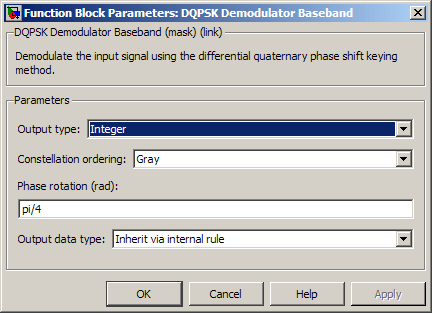DQPSK Demodulator Baseband
Demodulate DQPSK-modulated data
Library
PM, in Digital Baseband sublibrary of Modulation
Description
The DQPSK Demodulator Baseband block demodulates a signal that was modulated using the differential quadrature phase shift keying method. The input is a baseband representation of the modulated signal.
The input must be a discrete-time complex signal. The output depends on the phase
difference between the current symbol and the previous symbol. The first integer (or binary
pair, if you set the Output type parameter to
Bit) at the block output is the initial condition of zero because
there is no previous symbol.
This block accepts either a scalar or column vector input signal. For information about the data types each block port supports, see Supported Data Types.
Outputs and Constellation Types
When you set Output type parameter to
Integer, the block maps a phase difference of
θ + πm/2
to m, where θ represents the Phase rotation parameter and m is 0, 1, 2, or 3.
When you set the Output type parameter to
Bit, then the output contains pairs of binary values. The
reference page for the DQPSK Modulator Baseband block shows which phase
differences map to each binary pair, for the cases when the Constellation
ordering parameter is either Binary or
Gray.
Dialog Box

- Output type
Determines whether the output consists of integers or pairs of bits.
- Constellation ordering
Determines how the block maps each integer to a pair of output bits.
- Phase rotation (rad)
This phase difference between the current and previous modulated symbols results in an output of zero.
- Output data type
When the parameter is set to
'Inherit via internal rule'(default setting), the block will inherit the output data type from the input port. The output data type will be the same as the input data type if the input is of typesingleordouble.For integer outputs, this block can output the data types
int8,uint8,int16,uint16,int32,uint32,single, anddouble. For bit outputs, output can beint8,uint8,int16,uint16,int32,uint32,boolean,single, ordouble.
Supported Data Types
| Port | Supported Data Types |
|---|---|
Input |
|
Output |
|
Pair Block
Extended Capabilities
Version History
Introduced before R2006a